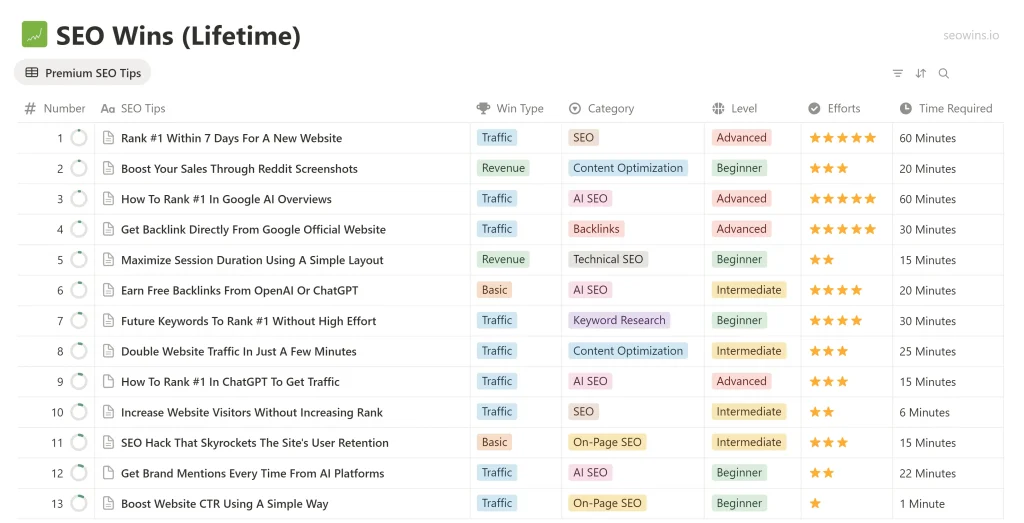The SEO landscape is changing faster than ever.
With the rise of ChatGPT, Gemini, Perplexity, etc., users are getting their answers directly from AI-driven engines, not just traditional search results. That means your next big SEO win isn’t just ranking on Google, it’s being cited, mentioned, or recommended by ChatGPT itself.
That’s why we need to do SEO for ChatGPT as well.
What Is SEO for ChatGPT?
It means optimizing your content so that AI models, such as ChatGPT (built by OpenAI), can easily understand, reference, and cite it when generating answers for users.
Instead of just targeting Google SERPs, you now optimize for:
- ChatGPT responses
- AI summaries on Bing Copilot or Perplexity
- Generative answer engines (GEO or AEO)
AI models look for clear, factual, structured, and authoritative content. So if your website checks those boxes, ChatGPT is far more likely to use it in its answers.
15 SEO Strategies for ChatGPT
Let’s know the techniques that can be used to grow traffic from ChatGPT,
1. Write in Question-and-Answer Format
ChatGPT is designed to answer questions, not scan keywords.
So you must write like the user asks and you answer.
Example:
- Bad: “Keyword research is an important SEO practice.”
- Good: “What is keyword research and why is it important for SEO?”
This structure increases your chances of being used in ChatGPT’s natural-language responses.
Pro Tip: Add an FAQ section at the bottom of your articles with 3–5 targeted questions.
2. Use Long-Tail and Conversational Keywords
AI tools favor natural, conversational language.
Focus on long-tail keywords like:
- “How to optimize for ChatGPT SEO”
- “Best AI SEO strategies for 2026/2027”
- “How to get cited by ChatGPT answers”
These queries mimic how users talk to AI. Tools like Keywords Everywhere, AnswerThePublic, or Google’s “People Also Ask” can help you discover them.
3. Structure Your Content Logically
AI models rely on structured data to understand context.
Use:
- H2s and H3s for clear hierarchy
- Lists and tables for easy summarization
- Short paragraphs (2 – 4 lines)
- Bold key points
This makes it easier for ChatGPT to parse your content and use it in concise summaries.
Bonus: Add “Table of Contents” at the top of long articles, it signals organization and authority.
4. Add Schema Markup (FAQ + HowTo + Article)
ChatGPT and other AI engines rely heavily on structured data (schema).
Add FAQPage, HowTo, and Article schema using tools like:
Example:
{
"@type": "FAQPage",
"mainEntity": [
{
"question": "What is SEO for ChatGPT?",
"acceptedAnswer": {
"text": "SEO for ChatGPT means optimizing content for AI-generated answers..."
}
}
]
}This helps AI systems read your content in a machine-friendly format.
5. Publish Fact-Based, Data-Driven Content
ChatGPT pulls answers from factual, verifiable data.
Add:
- Statistics
- Research sources
- Original data
- Screenshots or examples
Example:
“According to Semrush (2026), 61% of marketers believe AI summaries will replace featured snippets.”
AI models like that because they prefer content that sounds trustworthy and referenced.
6. Build Topical Authority Around One Core Theme
AI engines reward topic depth, not just keyword repetition.
So instead of publishing random posts, build a content cluster around one niche.
Example cluster:
- “What is SEO for ChatGPT?”
- “How to rank your website in AI answer engines”
- “Generative Engine Optimization (GEO) guide”
- “How ChatGPT sources its answers”
Interlink all related articles using descriptive anchor text.
This signals topical expertise, increasing your “AI visibility score”.
7. Use Author Pages and E-E-A-T Optimization
AI models prefer trusted, expert authors.
Follow Google’s E-E-A-T framework:
- Experience: Show real use cases or screenshots.
- Expertise: Add author credentials.
- Authoritativeness: Link to credible sites or studies.
- Trustworthiness: Add contact details, About page, and privacy policy.
Example:
“Written by Hridoy Rehman, SEO specialist and founder of SEO Wins.”
That makes your site more “trust-citable” for AI responses.
8. Target “AI Search Visibility” Through Bing SEO
ChatGPT’s web browsing and data retrieval often come from Bing’s index yet.
So, boosting your Bing SEO indirectly improves your ChatGPT SEO.
Here’s how:
- Submit your site to Bing Webmaster Tools
- Earn backlinks from Bing-indexed domains
- Optimize for Bing’s Core Web Vitals
- Target question-based search snippets
If ChatGPT cites sources from Bing, you want to be in that list.
9. Focus on Clear and Contextual Language
ChatGPT values clarity. Avoid over-optimization or keyword stuffing.
Instead, write contextually rich sentences that help the AI interpret meaning.
Example:
“SEO for ChatGPT focuses on optimizing content for AI-based answer engines like ChatGPT, Perplexity, and Copilot.”
This gives AI context without repetition.
Tip: Use semantically related terms (LSI keywords) such as:
- AI SEO optimization
- Generative search visibility
- Rank in AI-generated answers
- ChatGPT ranking guide
10. Update Your Content Frequently
AI models often rely on fresh data.
Outdated pages are less likely to appear in ChatGPT responses.
That’s why existing content optimization is required.
Set a reminder every 60 – 90 days to:
- Update stats
- Refresh examples
- Add a new section
- Change the “Last Updated” date
Active pages signal ongoing relevance, a major trust signal for AI engines.
🔥 SEO Wins Database
Use 150+ SEO and AI SEO strategies to boost traffic from search engines like Google, Bing, etc., and AI platforms like ChatGPT, Perplexity, etc., to boost revenue faster.

11. Earn Mentions and Citations (Not Just Links)
Unlike Google, ChatGPT doesn’t just use backlinks, it values brand mentions and citations.
How to build them:
- Publish guest posts on reputable sites
- Collaborate on expert roundups
- Get listed on directories
- Participate in podcasts or interviews
- Write comments on Reddit and mention your brand name
Even an unlinked brand mention helps ChatGPT identify your authority in that topic space.
12. Optimize for Featured Snippets and Zero-Click Answers
Featured snippets on Google often overlap with AI answers.
If you can win a snippet, you’re likely to be cited by ChatGPT too.
Here’s how:
- Use “What is”, “How to”, “List of” headings
- Answer directly in 40 – 60 words under that heading
- Add lists for “steps” or “tips”
Example:
What is ChatGPT SEO?
ChatGPT SEO means optimizing your website so that AI models like ChatGPT can understand, reference, and cite it in AI-generated responses.
Perfect AI summary content.
13. Optimize Images, Captions, and Alt Text
AI crawlers also analyze images, especially if your page has infographics or data visuals.
Add:
- Descriptive filenames (e.g.,
seo-for-chatgpt-strategies.png) - Alt text that explains what’s inside the image
- Captions that summarize the data point
These visuals make your page richer and more reference-ready.
14. Test Prompts to See If You’re Cited
Search your own niche inside ChatGPT.
Example:
- “What are the best SEO tools for 2026?”
- “What is SEO for ChatGPT?”
- “Top AI SEO techniques for marketers.”
If your content doesn’t appear, tweak your headings and phrasing.
Make your titles sound like questions ChatGPT users actually ask.
15. Create Tools or Interactive Assets
ChatGPT often references unique utilities, not just blog posts.
Build free tools such as:
- “ChatGPT SEO Score Checker”
- “AI Visibility Audit Tool”
- “Schema Generator for FAQ SEO”
Then write blog posts about each one.
This gives ChatGPT something unique to cite when users ask for tools, not just text.
Bonus: Emerging ChatGPT SEO Techniques
Now, let’s look at 2 bonuses,
1. GEO (Generative Engine Optimization)
GEO is the evolution of SEO for AI answers.
It’s about optimizing for summarization, not for ranking.
This means:
- Use summaries at the top of articles
- Provide fact-based intros
- Format each section to be easily quotable
2. Multi-Platform SEO
AI engines pull data from multiple sources like websites, social media, PDFs, YouTube captions, etc. So cross-post your content in LinkedIn, Threads, Medium, etc. to increase visibility.
Real-World Example
Let’s say you publish an article titled:
“AI SEO: 15 Proven Strategies for AI Search”
Inside, you:
- Use Q&A formatting
- Add FAQ schema
- Use “AI SEO strategies”, “how to rank in ChatGPT”, “ChatGPT SEO techniques” as LSI keywords
- Include facts, tables, and bullet lists
- Add author bio as well as update date
Result?
When someone asks ChatGPT:
How can I optimize my website for ChatGPT search?
The model has everything it needs to cite your content, clear sections, structured data, and trustworthy author info.
Quick Recap: SEO for ChatGPT Checklist
| Area | Optimization Focus |
|---|---|
| Content Format | Use Q&A, lists, short paragraphs |
| Keywords | Long-tail, conversational, AI-focused |
| Schema | FAQ, HowTo, Article |
| Authority | E-E-A-T, author bio, citations |
| Freshness | Update content every 60 – 90 days |
| Visibility | Earn mentions, featured snippets |
| Technical SEO | Fast, mobile, Bing submission |
| Monitoring | Test prompts, watch citations |
| Advanced | GEO formatting, llm.txt, AI tools |
Why You Need ChatGPT SEO
- 5.8+ billion monthly visits for ChatGPT
- AI-powered search tools (like Copilot) now appear inside Bing and Windows
- Users are starting to trust AI summaries more than clicking 10 blue links
That means, if your website doesn’t appear in AI-generated answers, you’re missing a rapidly growing source of visibility and credibility.
Conclusion
ChatGPT isn’t killing SEO, it’s transforming it.
To succeed, you must shift your mindset from ranking for keywords to being cited.
That means:
- Structuring your content for easy summarization
- Writing in natural Questions and Answers format
- Building topic authority
- Earning citations and mentions across the web
As AI-driven search grows, visibility in ChatGPT will be the new digital currency.
If you master SEO for ChatGPT now, you will not only dominate future AI answers but also stay ahead of every marketer still chasing the old Google-first model.
More SEO Tips:
